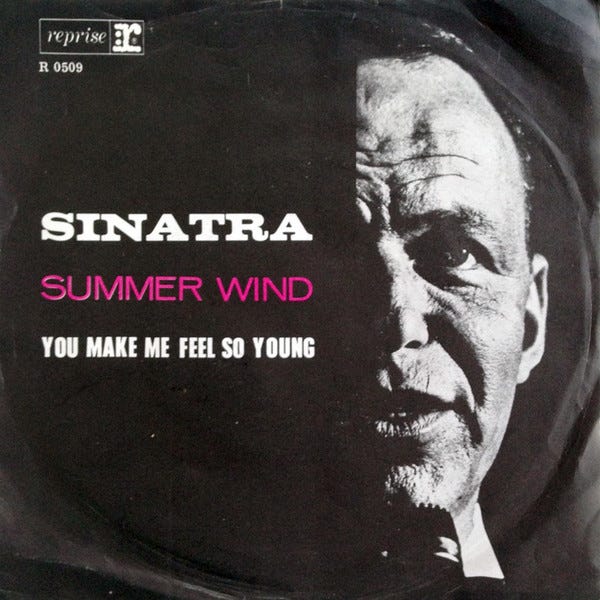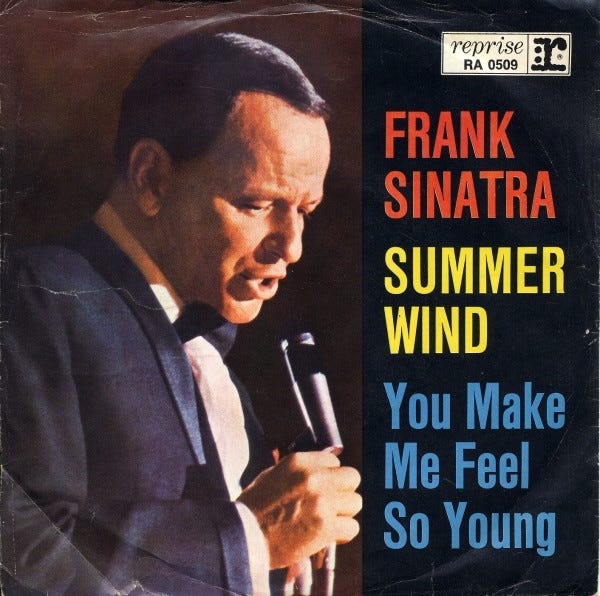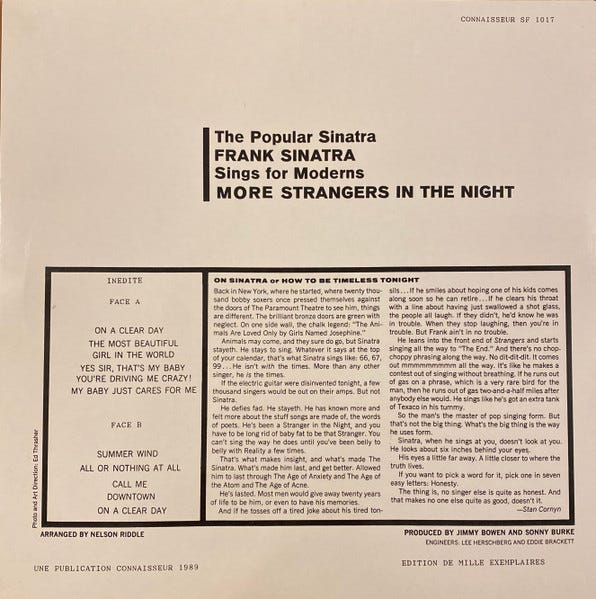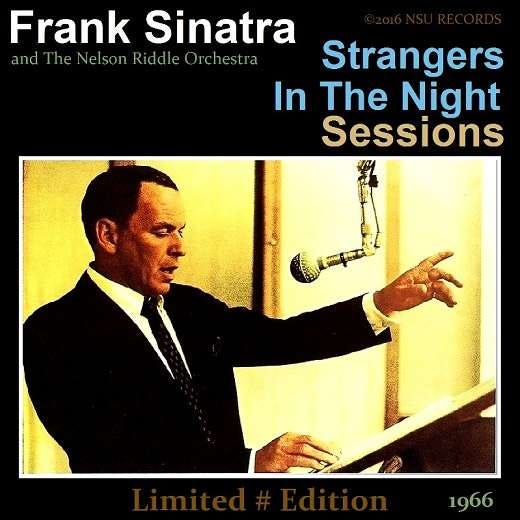Sinatra! Deep Cuts: "Summer Wind" (The Alternate Take)
Still Another Mini-Mystery in the Musical Life of Frank Sinatra
Lots of Frankophiles - many members of the “Frank Tank” - to thank on this one: Dan Levinson, David Rose, Jordan Taylor, Chuck Granata, Michael Kraus, Rob Waldman, Ed O’Brien, Scott Henderson, Tom Buckley, Adrian Galante, Jack Lewin, and Dr. Vance Adair.
Between 1963 and 1967, Sinatra and Nat King Cole enjoyed four major hit songs that all originated in Germany; two of them were by the same original lyricist, Hans Bradtke. (And if you do a search under that name, you will find dozens and dozens of songs with German titles, only a few of which were translated into other languages.) Herr Bradtke evidently had a penchant for songs about the summer - he was the original Deutschland Beach Boy - in that he gave us both “Those Lazy, Hazy Crazy Days of Summer” and “Summer Wind.” (For the record, the other two were both written by Bert Kaempfert, Cole’s “L - O - V - E” and Sinatra’s “Strangers in the Night.”)
I’ve seen the song listed as both “Sommervind” and “Die Sommer Wind.” Here’s the original German lyric, sung by Grethe Ingmann. As you can hear, it’s approached like a German country and western song, with Frau Ingmann accompanied by a Nashville-style piano very much in the style of Floyd Cramer.
That same year, Johnny Mercer - who had already written classic English lyrics for any number of great French songs - gave us his American adaptation of “Sommervind.” The earliest American recordings are very much in the quasi-country style of the original. The Wayne Newton version totally sounds like a Bert Kaempfert production in the spirit of “Wonderland By Night.”
The Perry Como version also features a Floyd Cramer-style slip-note piano accompaniment, as well as a Ray Charles Singers choral background. I confess it’s not one of my favorite Como performances; it’s somnambulant in the extreme, even for Mr. PC, although there’s a bonus in a second chorus of lyrics not sung by FS: “Now I’m alone / I might have known / But who can guess?...” (Interestingly, on Johnny Mercer’s own recording from 1974, heard below, he doesn’t sing that second chorus.) It’s also reminiscent of the general style of the great country crooner Eddy Arnold, a/k/a “The Como of Country.”
In 1966, Sinatra and Nelson Riddle completely changed the vibe of the song, from a very relaxed kind of Nashville ballad to a much more edgy and exciting swinger; like a lot of the best music of Sinatra (not to mention Billie Holiday and Louis Armstrong) it swings defiantly and poignantly in the face of abject despair. Throwing in a modulation - and then another - a device Sinatra and Riddle didn’t use very often, makes it even more dynamic. I’ve written about the track extensively in numerous books, but I’ll just say that Riddle employs a whole new tonal color - a Hammond B3 electric organ played by Artie Kane - to suggest the summer wind itself, the sirocco breeze that passes through Italy and the southern part of Europe. In that respect, it’s a German song that evokes an Italianate sensibility.
I’m certain that everybody reading this is highly familiar with the classic take, from the 1966 Strangers in the Night album (yes - that’s two German songs on one FS album - javol!) Anyhow, here it is. I remember seeing Sinatra singing “Summer Wind” in concert, and he would sometimes introduce it by saying, “this one has a very distinct introduction by Nelson.” (I’m also including two picture covers from the single version as released in the Netherlands and Germany; yes, FS re-imported a German song back to its home country, rather like Ella Fitzgerald singing ‘Mack the Knife” in Berlin. Javol again! )


My friends David Rose - himself a fine singer (no relation to the conductor), coincidentally himself based in Germany - and Dan Levinson, a wonderful multi-stylistic, multi-reed player (based in the West Village) - were the first to notice that an alternate take of the song is heard over the end credits to the 1984 film The Pope of Greenwich Village. It’s somewhat confusing, because the song is heard multiple times in the film, and there are multiple versions of those scenes on YouTube, but, as you can plainly hear, this clip does indeed use an alternate take. (I’m also attaching an alternate to the alternate, a link to the complete film which utilizes the more familiar take.).
(Oh ho - it seems you have to go to YouTube itself to view these, but don’t let that stop you. )
This version of the end titles has the alternate take. Upon further reflection, it seems highly possible that this is strictly a youTube concoction - some funster took the alternate and stitched it to the end titles. No other version of the film that we have seen features the alternate. In other words, this is quite possibly - as they say in Donnie Brasko - a fugazi:
End Titles with Alternate Take - Click Here
Here is the full movie on youtube, with the standard take - Click Here
The Silva discography (Luiz Carlos Do Nascimento Silva) and the Sinatraphile scholar Ed O’Brien both confirm that the familiar take is #7 and the “new” take is #5. As you can hear, the two takes are extremely different. The alternate is looser and somewhat jazzier, and less sharply focused. To my ears, it almost sounds like a rehearsal, like FS and Nelson are just running the chart down. There are word changes, like “stroke your hair” inside of “touch your hair” and major differences in phrasing throughout.
Hardcore, deep cut Sinatra collectors know of the Inside releases, a series of LPs and then CDs containing alternate takes and session material from the singer’s sessions on Reprise, mostly from 1960 (Ring-A-Ding-Ding) to 1967 (The World We Knew). Alas, the Inside series only included a few songs from the 1966 Strangers in the Night, and “Summer Wind” wasn’t one of them. However, prior to the Inside releases, there was a bootleg LP of Strangers material issued in 1989 on a label called Connaisseur. Titled More Strangers in the Night, this was apparently a mitzvah from the French Underground. Below is the cover, and, something that just turned up on YouTube, the “Summer Wind” alternate, as apparently taken from that French LP. AND… just I was about to “publish” this posting, Michael Kraus came across a CD of unknown origins of essentially the same material.


And here, in fact, from the “other” edition (“Naughty Dog”), is fully nine minutes of session material, breakdowns etc., on “Summer Wind”:


The question remains, is there any chance that the version of The Pope of Greenwich Village with the alternate take is somehow legitimate, and not a fugazi? Chuck Granata provides us with some valuable context:
Sometimes the Music Supervisor will ask the record company to provide the masters for use in a film. They almost always have specific needs. For example, they may have needed to fit a tighter time constraint for the End Credits, and asked if the label had a slightly faster version. So, it’s plausible that the label sent them two versions when they agreed to the sync license: the original plus a slightly faster alternate. Remember: sync licenses - especially back then - were HUGE windfalls for an artist and label. I wouldn’t be surprised if the production company paid a million bucks to use that song in two places in that film.
I remember Eli Olin from EMI Special Markets telling me decades ago that Mickey Rudin wouldn’t even consider issuing a sync license for a film unless they offered $650k. And Eli was only working on sync for the Capitol material. Imagine what the ask for Reprise tracks used to be, considering Sinatra owned those masters outright!
I would love to see this properly issued. In the meantime, here it is for us to enjoy.
As a postscript, here’s Johnny Mercer himself, singing it on one of his final recordings, taped in London in 1974:
Very Special thanks to the fabulous Ms. Elizabeth Zimmer, for expert proofreading of this page, and scanning for typos, mistakes, and other assorted boo-boos!
Sing! Sing! Sing! : My tagline is, “Celebrating the great jazz - and jazz-adjacent - singers, as well as the composers, lyricists, arrangers, soloists, and sidemen, who help to make them great.”
A production of KSDS heard Saturdays at 10:00 AM Pacific; 1:00PM Eastern.
To listen to KSDS via the internet (current and recent shows are available for streaming.) click here.
The whole series is also listenable on Podbean.com, click here.
SING! SING! SING!
May 18, 2024: CALIFORNIA, HERE I COME!
SLOUCHING TOWARDS BIRDLAND is a subStack newsletter by Will Friedwald. The best way to support my work is with a paid subscription, for which I am asking either $5 a month or $50 per year. Thank you for considering. (Thanks as always to Beth Naji & Arlen Schumer for special graphics.) Word up, peace out, go forth and sin no more! (And always remember: “A man is born, but he’s no good no how, without a song.”)
Note to friends: a lot of you respond to my SubStack posts here directly to me via eMail. It’s actually a lot more beneficial to me if you go to the SubStack web page and put your responses down as a “comment.” This helps me “drive traffic” and all that other social media stuff. If you look a tiny bit down from this text, you will see three buttons, one of which is “comment.” Just hit that one, hey. Thanks!








The video you posted titled "Alternate Version" sounds like a Frankenstein audio creation to me. It sounds like someone took the vocal from one of the takes on that nine-minute tape and sync-ed it with the familiar backing track. The giveaway is the tone of the vocal, which sounds electronically altered (probably because it was slowed by speed but not pitch). By the way, that nine-minute rehearsal tape was on YouTube over a decade ago, but got removed. I recorded the audio and made an MP3, assuming that bootleg Frank Sinatra material was going to be deleted sooner or later.
“The Complete Lyrics of Johnny Mercer,” p. 328, includes the second verse sung by Como in a section labeled “Early Version.” It follows a verse that no one has sung.